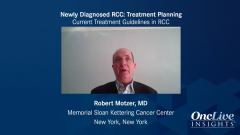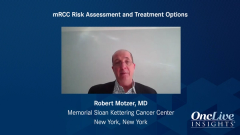
Newly Diagnosed RCC: Treatment Planning
Guidelines and recommendations by clinicians on treatment approaches for newly diagnosed renal cell carcinoma and regimens in the pipeline that may impact future treatment.
Episodes in this series

Robert Alter, MD: When we see these patients come into the office and we have done the work-up, we feel as if we have enough information, then we may have a plan to take care of these patients. Initially, dating back 25 years, we believed that cytoreductive nephrectomy was the initial treatment plan for patients, even in the setting of metastases.
With the newer publications about evaluating patients receiving oral TKI [tyrosine kinase inhibitor] therapy, we were having patients undergo cytoreductive nephrectomies, and that has proven that sometimes cytoreductive nephrectomies do not have to be considered. There are times where the patients’ challenges make us think that our course of initial management must be adjusted. Patients having hematuria may be subtle, but if a patient begins to have symptomatic hematuria, though we may have thought that an oral tyrosine kinase inhibitor as initial therapy may be beneficial, surgery may have to be considered to allow these patients the ability to control their symptoms. Patients with bone metastases can have extensive diseases where palliative radiation therapy may be beneficial.
Pain may be associated with a metastases or the primary tumor itself, which should be addressed and which may expedite our treatment plan, when we compare surgery vs initial or systemic therapy. Hypercalcemia be a complication of renal cell carcinoma [RCC]. The extent of the disease that patients have, whether they have a tumor thrombus, which may cause vascular compromise, may also change our initial thought processes from systemic therapy to surgical intervention.
This must be utilized through a multidisciplinary team: vascular surgeons, nephrologists, and urologists can offer a significant help in assisting with patient care. The challenge that we feel the most is something that we see on the first visit: the patient’s functional performance status.
At times, the patients can feel relatively asymptomatic or minimally symptomatic, in which case proceeding with therapies may be no challenge. But if a patient’s functional performance status is decreased because of a tumor or other comorbid conditions, our therapies may have to be adjusted, or the considerations of surgeon may have to be altered simply because of the patient, not just the cancer.
Robert Motzer, MD: The NCCN [National Comprehensive Cancer Network] has developed guidelines for systemic therapy for kidney cancer. These are widely followed. For the most part, patients are grouped into first-line therapy and subsequent therapy, and by the clear cell histology and the non–clear cell histology, through the NCCN guidelines.
Most of the evidence, time, and effort have gone into the clear cell population in first-line therapy because that is where most of the data are. For the NCCN guidelines, for patients who have clear cell RCC, some of the regimens that are used that are considered level 1 are pembrolizumab plus axitinib, which is preferred, or sunitinib and pazopanib for a patient with favorable risk. This also receives a high ranking. Other regimens are included in treatment recommendations for patients with favorable risk, including ipilimumab and nivolumab, as well as axitinib and nivolumab.
In the patients who have intermediate or poor risk, in first-line therapy for clear cell renal cell carcinoma, the 2 top regimens recommended by the NCCN are either the nivolumab plus ipilimumab regimen, or else axitinib plus pembrolizumab. There are other options for other patients as well, including cabozantinib, or axitinib plus avelumab, but the nivolumab plus ipilimumab regimen or axitinib plus pembrolizumab are really the 2 most strongly recommended. In subsequent therapy, the evidence for therapy has been based on patients treated with TKIs in first-line therapy. There is very little evidence or studies that have addressed the best way to treat a patient who has progressed on an IO [immune oncology] combination.
Most of the recommendations per NCCN include nivolumab, lenvatinib plus everolimus in second-line therapy for patients who have had TKI, and cabozantinib. These recommendations are largely based on patients who have progressed on sunitinib or pazopanib. That has changed with these new combinations. It has illuminated an unmet need to define best treatment in that setting. There are much fewer data about what therapy is effective in patients who have non–clear renal cell carcinoma. There are a number of different agents that have been developed for clear cell renal cell carcinoma that have been extrapolated to treat non–clear cell renal cell carcinoma. They do have some level of effectiveness, and so they are included in recommendations.
The treatment that has been most extensively studied is sunitinib. Recently, there has been enthusiasm in studies around cabozantinib in that setting. Most recently, there was a paper outlining the efficacy for lenvatinib plus everolimus to treat non–clear cell renal cell carcinoma. Those are 3 big contenders for that population.
Transcript edited for clarity.


















































